unit1 grammar-modal verbs[下学期]
文档属性
| 名称 | unit1 grammar-modal verbs[下学期] |
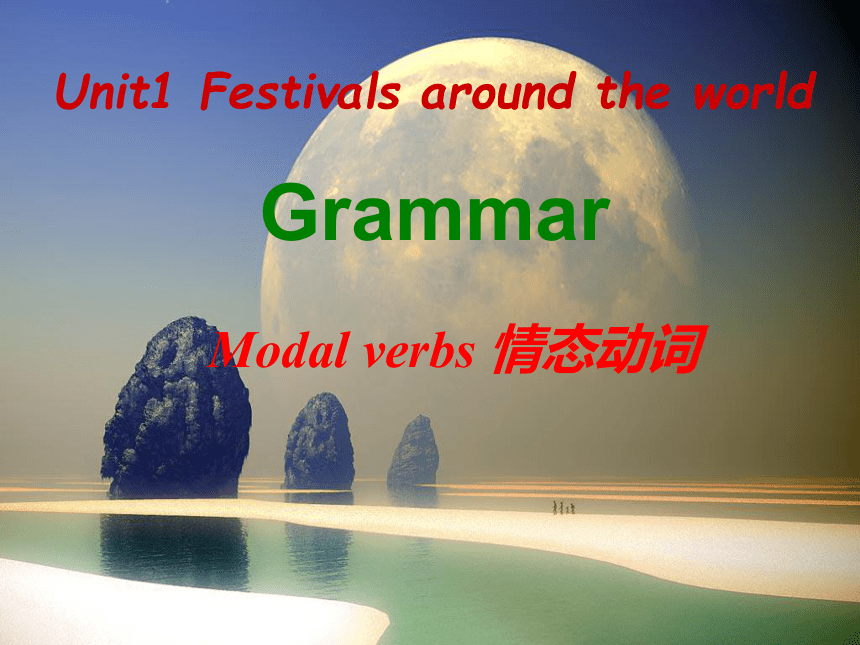
|
|
| 格式 | rar | ||
| 文件大小 | 283.6KB | ||
| 资源类型 | 教案 | ||
| 版本资源 | 通用版 | ||
| 科目 | 英语 | ||
| 更新时间 | 2007-03-18 00:00:00 | ||
图片预览

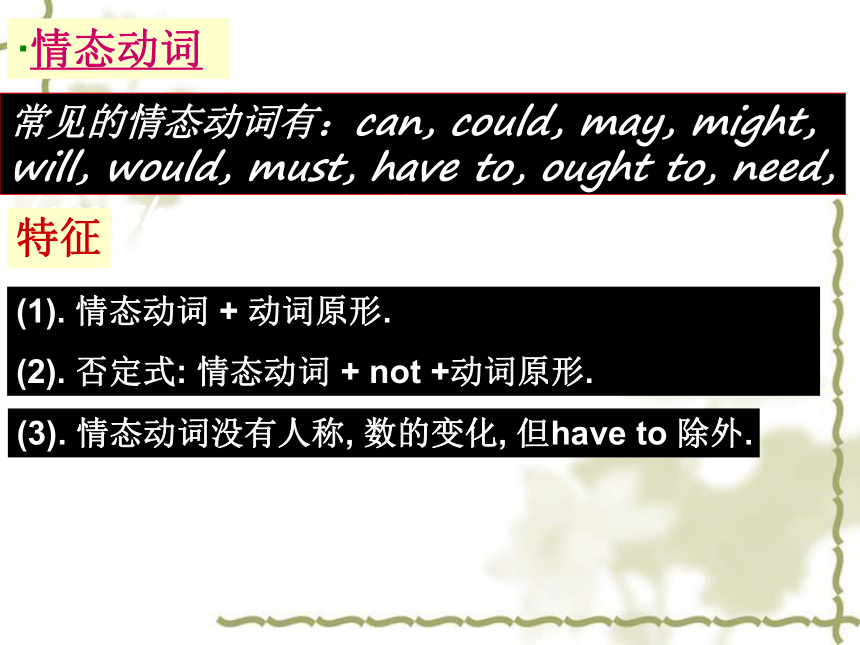
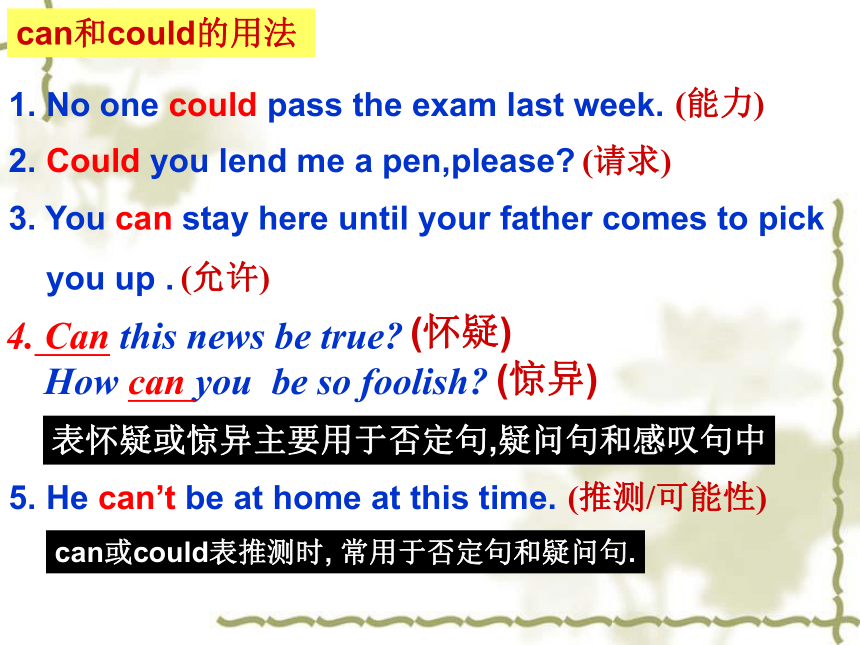
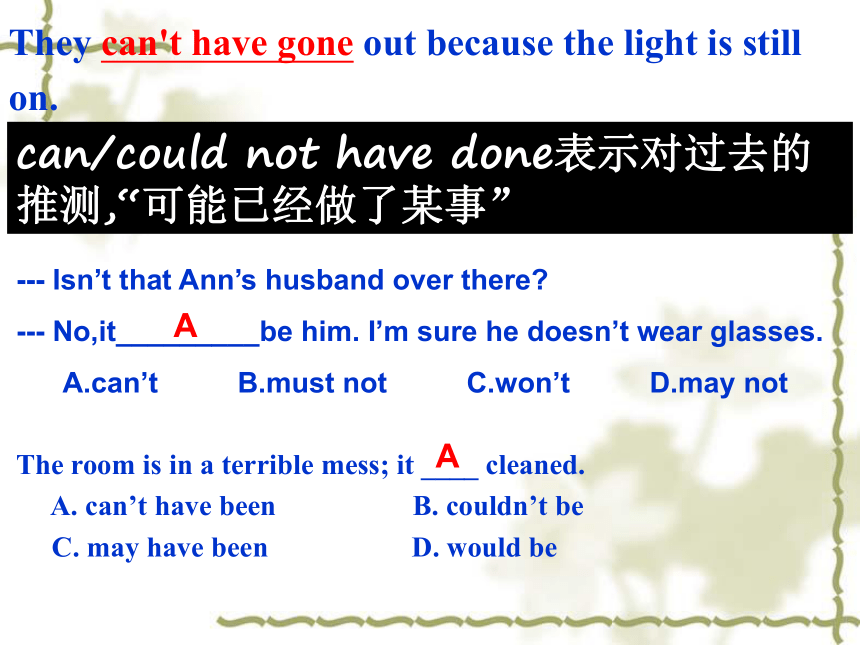
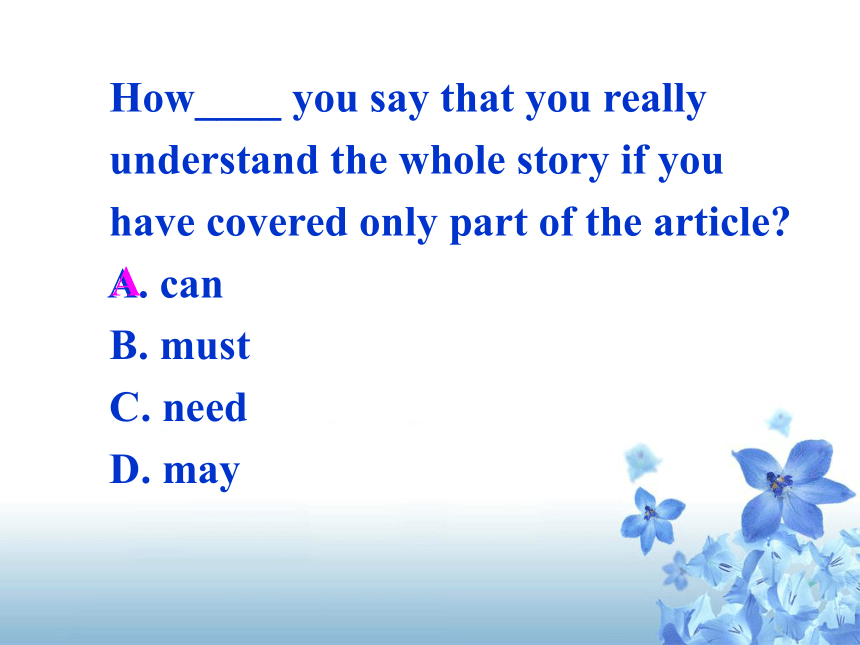
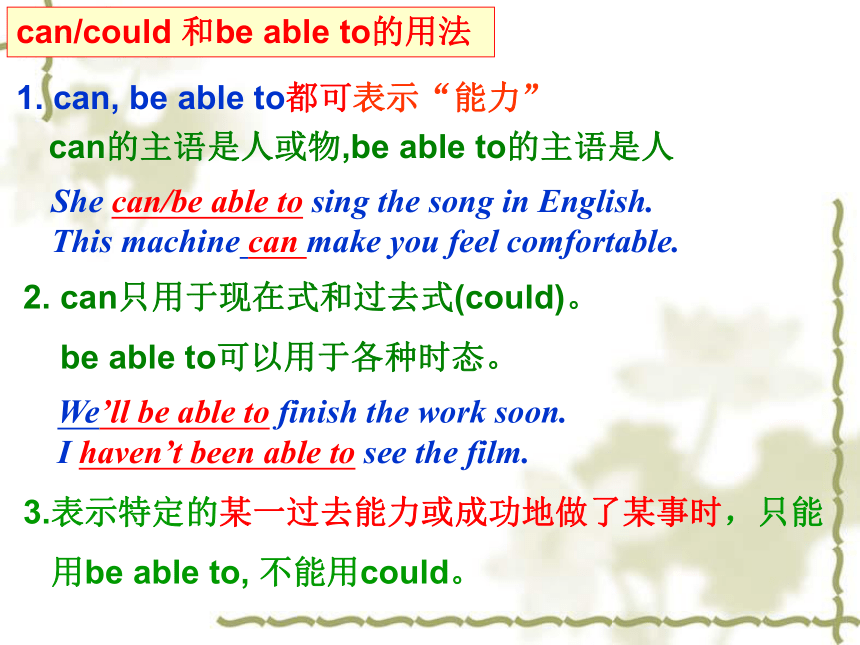
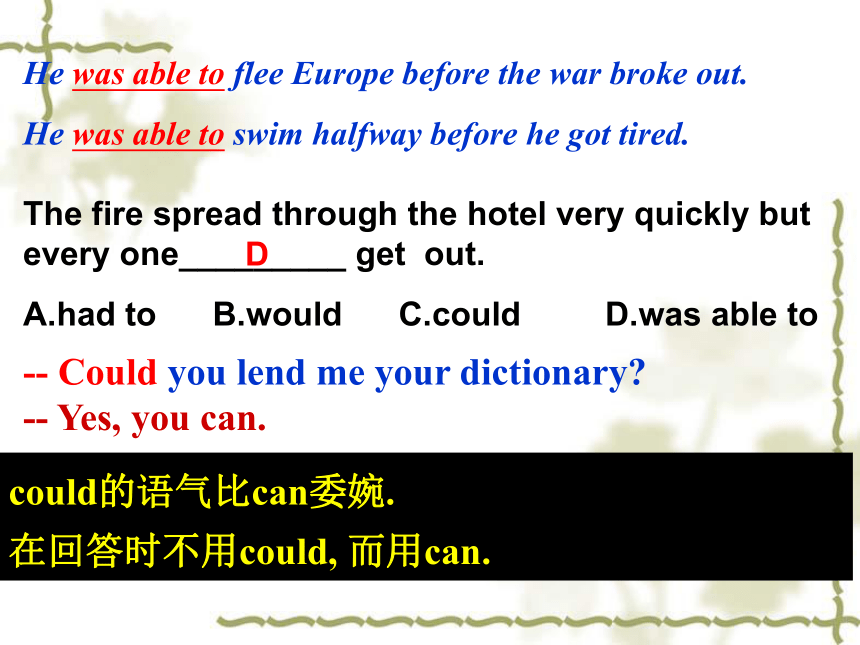
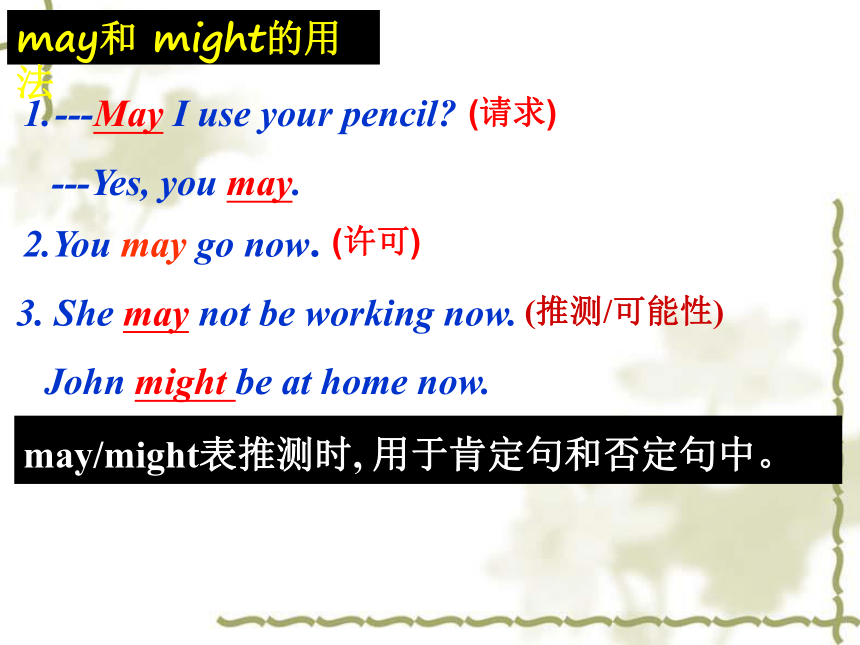
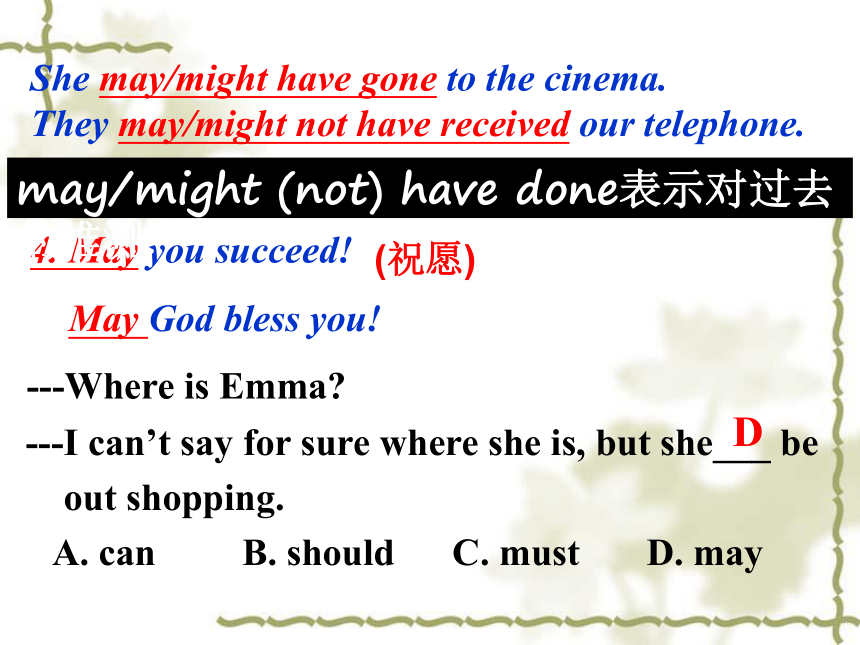
文档简介
课件28张PPT。Unit1 Festivals around the worldGrammarModal verbs 情态动词·情态动词(1).?情态动词 + 动词原形.?
(2). 否定式: 情态动词 + not +动词原形.(3).?情态动词没有人称, 数的变化, 但have to 除外. 常见的情态动词有:can, could, may, might, will, would, must, have to, ought to, need, dare, shall, should 等。 特征can和could的用法1. No one could pass the exam last week.2. Could you lend me a pen,please?3. You can stay here until your father comes to pick
you up .5. He can’t be at home at this time. (能力)(推测/可能性)(允许)(请求)can或could表推测时, 常用于否定句和疑问句.4. Can this news be true?
How can you be so foolish? (怀疑)(惊异)表怀疑或惊异主要用于否定句,疑问句和感叹句中They can't have gone out because the light is still on.can/could not have done表示对过去的推测,“可能已经做了某事”某事”。--- Isn’t that Ann’s husband over there?
--- No,it_________be him. I’m sure he doesn’t wear glasses.
A.can’t B.must not C.won’t D.may not
The room is in a terrible mess; it ____ cleaned.
A. can’t have been B. couldn’t be
C. may have been D. would be
AA How____ you say that you really
understand the whole story if you
have covered only part of the article?
A. can
B. must
C. need
D. mayAcan/could 和be able to的用法1. can, be able to都可表示“能力”can的主语是人或物,be able to的主语是人 She can/be able to sing the song in English.
This machine can make you feel comfortable.2. can只用于现在式和过去式(could)。
be?able?to可以用于各种时态。 We’ll be able to finish the work soon.
I haven’t been able to see the film.3.表示特定的某一过去能力或成功地做了某事时,只能
用be?able?to, 不能用could。 He?was?able?to?flee?Europe?before?the?war?broke?out. ??
He?was?able?to?swim?halfway?before?he?got?tired. The fire spread through the hotel very quickly but every one_________ get out.
A.had to B.would C.could D.was able to
D-- Could you lend me your dictionary?-- Yes, you can. could的语气比can委婉.
在回答时不用could, 而用can.may和 might的用法---May I use your pencil?
---Yes, you may.3. She may not be working now.
John might be at home now.(请求)2.You may go now.(许可)(推测/可能性)may/might表推测时, 用于肯定句和否定句中。She may/might have gone to the cinema. They may/might not have received our telephone.4. May you succeed!
May?God?bless?you! may/might (not) have done表示对过去的推测.(祝愿) ---Where is Emma?
---I can’t say for sure where she is, but she___ be
out shopping.
A. can B. should C. must D. mayD--May I /Might we …?--Yes, please.或Certainly/Yes,you may.( 肯定回答)-- Please don’t.或No, you mustn’t.( 否定回答)-- May/Might we leave now?
-- No, you mustn’t. /certainly.must的用法: 1. “必须”
(说话人的主观看法)You must talk to them about their study.Why must it rain on Sunday? 2. “偏偏要”He must be ill. He looks pale.3. “一定/肯定” 推测,暗含很大的可能性。must表推测时, 只能用于肯定句.We mustn’t waste our time.4. must not “不准/不可以”表禁止---- May I take this magazine out? ---- No, you mustn’t.must 用于一般疑问句的时候,肯定回答应用yes, you must 或者 I’m afraid so, 其否定回答应用 needn’t 或者 don’t have to。5. Must的否定式: need not 或 don’t have to-- Must I finish my homework now?
-- yes, you must. 或
-- No, you needn’t / you don’t have to. will和would的用法:1. will do 用于构成将来时是助动词。I will tell you something important.2. The whole family will come for dinner .
She asked if I would help.(承诺和意愿)3. Would you join us?表示请求,此时用would语气较委婉。4. In those days,whenever I had difficulties, I would go to
Mr.Shen for help.(总是/总会)would+do表示过去的习惯, “总是/总会”shall 的用法:Perhaps I shall pay a visit to England this winter.Shall与第一人称连用, 表“将来”.2. You shall do as I say.
Tell him that he shall have the book tomorrow.
Nothing shall stop me doing it. (命令)(允诺)(决心)shall用于第二、三人称的陈述句表示说话人给对方的允诺、警告、命令、威胁等。3. Shall I open the window for you?(征求意见)
Shall he fetch some water for you?(请求)shall在疑问句中, 与第一、三人称连用,表示请求或征求对方的意见。should 的用法:You should keep your promise.1. should表示劝告, 建议, 命令.It’s nearly 7 o’clock. Dad should come home soon.
2. should + 动词原形用于陈述句, 表示推测, “应该”. You should have told her the truth earlier.
She shouldn’t have left without saying a word.3. should have done “本应该…”. 表示“本应该 做的
事但没有做”should not have done表示“不该做的事但却做到了.”1.---There were already five people in the car but they managed to take me as well.
---It ____a comfortable journey. ( )
A. can't be B. mustn't have been
C. shouldn't be D. couldn't have been
D2.The fire spread through the hotel very quickly but everyone ___ get out. ( )
A. had to B. would
C. could D. was able to
DEXERCISES4. Peter ___ come with us tonight, but he isn’t very sure.
must B. can C. may D. willC5. --- Could I call you by your first name? --- Yes, you____.
A. will B. could C. may D. mightC6. Sorry, I ’m late. I ___ have turned off the alarm clock and gone back to sleep again.
might B. should C. can D. willA7.--Excuse me, but I want to use your computer to type a report.
--You ____ have my computer if you don’t take care of it.
A. shan’t B. might not C. needn’t D. shouldn’tA8. ---When can I come for the photos ? I need them tomorrow afternoon.
---They _____be ready by 12 : 00 .
A. can B. should C. might D. needB9. With so much work on hand, you ____to see the game last night.
A. mustn’t go B. could have gone
C. shouldn’t go D. shouldn’t have goneD10.Johnny, you ______play with the knife, you ____hurt yourself. ( )
A. won't ; can't B. mustn't ; may
C. shouldn't ; must D. can't ; wouldn'tB11. I missed the bus, so I ___ go home on foot.
A. must B. may C. can D. had toD 2. A: ______ Xiao Feng find the origin of Easter from that book?
B: No, he _____________. 1. A: ______ you like to go to a special event with us on Saturday?
B: Yes, I _____________________ _________.Would’d like to go with you on SaturdayCouldcouldn’t find itExercise 3. A: _____ I go with my friend to the harvest festival?
B: Yes, you _________________ ________. 4. A: If I want to be a doctor _______ I study science?
B: Yes, you ____________________. should study scienceMay may go ( with your shouldfriends )5. A: He is very handsome. ____ he play the role of the prince?
B: No, he _______________________ ______. can’t play the role of theCanprince 6. A: The neighbour’ s children are older this year. _______________ they stop playing tricks at Halloween?
B: Perhaps, they _______.Mightor Shouldmightmust 和have?to1.Must用于一般问句中,肯定回答用must否定式用?needn’t或don’t have to,做?“不必”,mustn’t表示“禁止,不允许” ?— Must?I?finish?all?assignments?at?a?time? ??—Yes, you must.
No,?you?needn't. You?mustn’t?get?down?while?the?car?is?still? moving. I don’t like this TV set. We must buy a new one. There was no more bus. They had to walk home.2.表示“必须”这个意思时,must?和have?to?稍有区别。must着重说明主观看法,have?to?强调客观需要。另外,have?to?能用于更多时态。 ?You?must?be?the?new?teacher. ?
He?must?be?joking. There?is?nobody?here.?They?must?have?all gone?home. 3.must表示对某人某事的猜测,?作“准是”,“一定” ,一般用于肯定句中。对过去发生的事情作肯定判断用must have done He must come and worry her with question, just when she was busy cooking the dinner. Of course,after I gave her my advice,she must go and do the opposite。4. Must表示“偏要,硬要”,指做令人不快的事情Thank you
(2). 否定式: 情态动词 + not +动词原形.(3).?情态动词没有人称, 数的变化, 但have to 除外. 常见的情态动词有:can, could, may, might, will, would, must, have to, ought to, need, dare, shall, should 等。 特征can和could的用法1. No one could pass the exam last week.2. Could you lend me a pen,please?3. You can stay here until your father comes to pick
you up .5. He can’t be at home at this time. (能力)(推测/可能性)(允许)(请求)can或could表推测时, 常用于否定句和疑问句.4. Can this news be true?
How can you be so foolish? (怀疑)(惊异)表怀疑或惊异主要用于否定句,疑问句和感叹句中They can't have gone out because the light is still on.can/could not have done表示对过去的推测,“可能已经做了某事”某事”。--- Isn’t that Ann’s husband over there?
--- No,it_________be him. I’m sure he doesn’t wear glasses.
A.can’t B.must not C.won’t D.may not
The room is in a terrible mess; it ____ cleaned.
A. can’t have been B. couldn’t be
C. may have been D. would be
AA How____ you say that you really
understand the whole story if you
have covered only part of the article?
A. can
B. must
C. need
D. mayAcan/could 和be able to的用法1. can, be able to都可表示“能力”can的主语是人或物,be able to的主语是人 She can/be able to sing the song in English.
This machine can make you feel comfortable.2. can只用于现在式和过去式(could)。
be?able?to可以用于各种时态。 We’ll be able to finish the work soon.
I haven’t been able to see the film.3.表示特定的某一过去能力或成功地做了某事时,只能
用be?able?to, 不能用could。 He?was?able?to?flee?Europe?before?the?war?broke?out. ??
He?was?able?to?swim?halfway?before?he?got?tired. The fire spread through the hotel very quickly but every one_________ get out.
A.had to B.would C.could D.was able to
D-- Could you lend me your dictionary?-- Yes, you can. could的语气比can委婉.
在回答时不用could, 而用can.may和 might的用法---May I use your pencil?
---Yes, you may.3. She may not be working now.
John might be at home now.(请求)2.You may go now.(许可)(推测/可能性)may/might表推测时, 用于肯定句和否定句中。She may/might have gone to the cinema. They may/might not have received our telephone.4. May you succeed!
May?God?bless?you! may/might (not) have done表示对过去的推测.(祝愿) ---Where is Emma?
---I can’t say for sure where she is, but she___ be
out shopping.
A. can B. should C. must D. mayD--May I /Might we …?--Yes, please.或Certainly/Yes,you may.( 肯定回答)-- Please don’t.或No, you mustn’t.( 否定回答)-- May/Might we leave now?
-- No, you mustn’t. /certainly.must的用法: 1. “必须”
(说话人的主观看法)You must talk to them about their study.Why must it rain on Sunday? 2. “偏偏要”He must be ill. He looks pale.3. “一定/肯定” 推测,暗含很大的可能性。must表推测时, 只能用于肯定句.We mustn’t waste our time.4. must not “不准/不可以”表禁止---- May I take this magazine out? ---- No, you mustn’t.must 用于一般疑问句的时候,肯定回答应用yes, you must 或者 I’m afraid so, 其否定回答应用 needn’t 或者 don’t have to。5. Must的否定式: need not 或 don’t have to-- Must I finish my homework now?
-- yes, you must. 或
-- No, you needn’t / you don’t have to. will和would的用法:1. will do 用于构成将来时是助动词。I will tell you something important.2. The whole family will come for dinner .
She asked if I would help.(承诺和意愿)3. Would you join us?表示请求,此时用would语气较委婉。4. In those days,whenever I had difficulties, I would go to
Mr.Shen for help.(总是/总会)would+do表示过去的习惯, “总是/总会”shall 的用法:Perhaps I shall pay a visit to England this winter.Shall与第一人称连用, 表“将来”.2. You shall do as I say.
Tell him that he shall have the book tomorrow.
Nothing shall stop me doing it. (命令)(允诺)(决心)shall用于第二、三人称的陈述句表示说话人给对方的允诺、警告、命令、威胁等。3. Shall I open the window for you?(征求意见)
Shall he fetch some water for you?(请求)shall在疑问句中, 与第一、三人称连用,表示请求或征求对方的意见。should 的用法:You should keep your promise.1. should表示劝告, 建议, 命令.It’s nearly 7 o’clock. Dad should come home soon.
2. should + 动词原形用于陈述句, 表示推测, “应该”. You should have told her the truth earlier.
She shouldn’t have left without saying a word.3. should have done “本应该…”. 表示“本应该 做的
事但没有做”should not have done表示“不该做的事但却做到了.”1.---There were already five people in the car but they managed to take me as well.
---It ____a comfortable journey. ( )
A. can't be B. mustn't have been
C. shouldn't be D. couldn't have been
D2.The fire spread through the hotel very quickly but everyone ___ get out. ( )
A. had to B. would
C. could D. was able to
DEXERCISES4. Peter ___ come with us tonight, but he isn’t very sure.
must B. can C. may D. willC5. --- Could I call you by your first name? --- Yes, you____.
A. will B. could C. may D. mightC6. Sorry, I ’m late. I ___ have turned off the alarm clock and gone back to sleep again.
might B. should C. can D. willA7.--Excuse me, but I want to use your computer to type a report.
--You ____ have my computer if you don’t take care of it.
A. shan’t B. might not C. needn’t D. shouldn’tA8. ---When can I come for the photos ? I need them tomorrow afternoon.
---They _____be ready by 12 : 00 .
A. can B. should C. might D. needB9. With so much work on hand, you ____to see the game last night.
A. mustn’t go B. could have gone
C. shouldn’t go D. shouldn’t have goneD10.Johnny, you ______play with the knife, you ____hurt yourself. ( )
A. won't ; can't B. mustn't ; may
C. shouldn't ; must D. can't ; wouldn'tB11. I missed the bus, so I ___ go home on foot.
A. must B. may C. can D. had toD 2. A: ______ Xiao Feng find the origin of Easter from that book?
B: No, he _____________. 1. A: ______ you like to go to a special event with us on Saturday?
B: Yes, I _____________________ _________.Would’d like to go with you on SaturdayCouldcouldn’t find itExercise 3. A: _____ I go with my friend to the harvest festival?
B: Yes, you _________________ ________. 4. A: If I want to be a doctor _______ I study science?
B: Yes, you ____________________. should study scienceMay may go ( with your shouldfriends )5. A: He is very handsome. ____ he play the role of the prince?
B: No, he _______________________ ______. can’t play the role of theCanprince 6. A: The neighbour’ s children are older this year. _______________ they stop playing tricks at Halloween?
B: Perhaps, they _______.Mightor Shouldmightmust 和have?to1.Must用于一般问句中,肯定回答用must否定式用?needn’t或don’t have to,做?“不必”,mustn’t表示“禁止,不允许” ?— Must?I?finish?all?assignments?at?a?time? ??—Yes, you must.
No,?you?needn't. You?mustn’t?get?down?while?the?car?is?still? moving. I don’t like this TV set. We must buy a new one. There was no more bus. They had to walk home.2.表示“必须”这个意思时,must?和have?to?稍有区别。must着重说明主观看法,have?to?强调客观需要。另外,have?to?能用于更多时态。 ?You?must?be?the?new?teacher. ?
He?must?be?joking. There?is?nobody?here.?They?must?have?all gone?home. 3.must表示对某人某事的猜测,?作“准是”,“一定” ,一般用于肯定句中。对过去发生的事情作肯定判断用must have done He must come and worry her with question, just when she was busy cooking the dinner. Of course,after I gave her my advice,she must go and do the opposite。4. Must表示“偏要,硬要”,指做令人不快的事情Thank you
